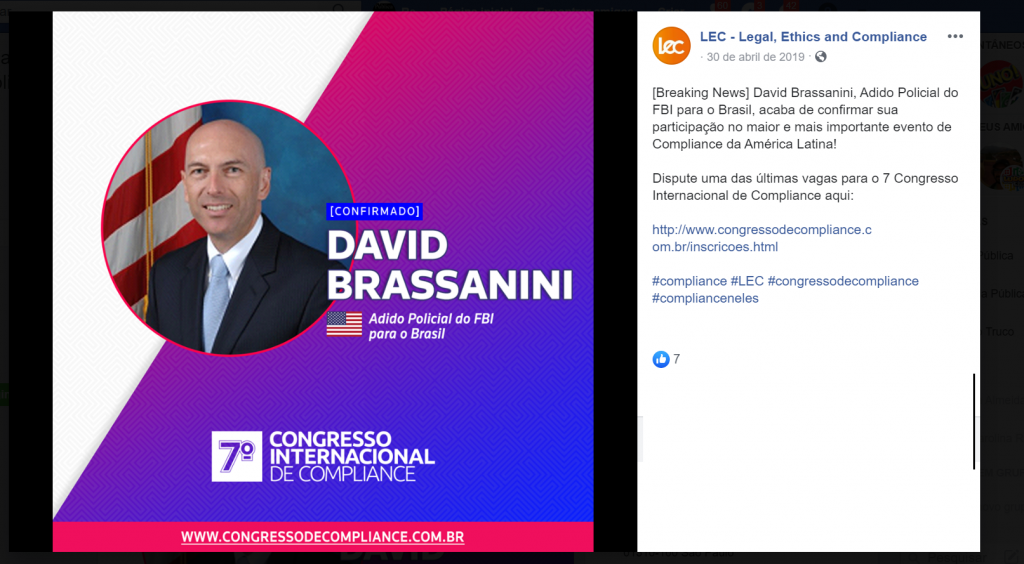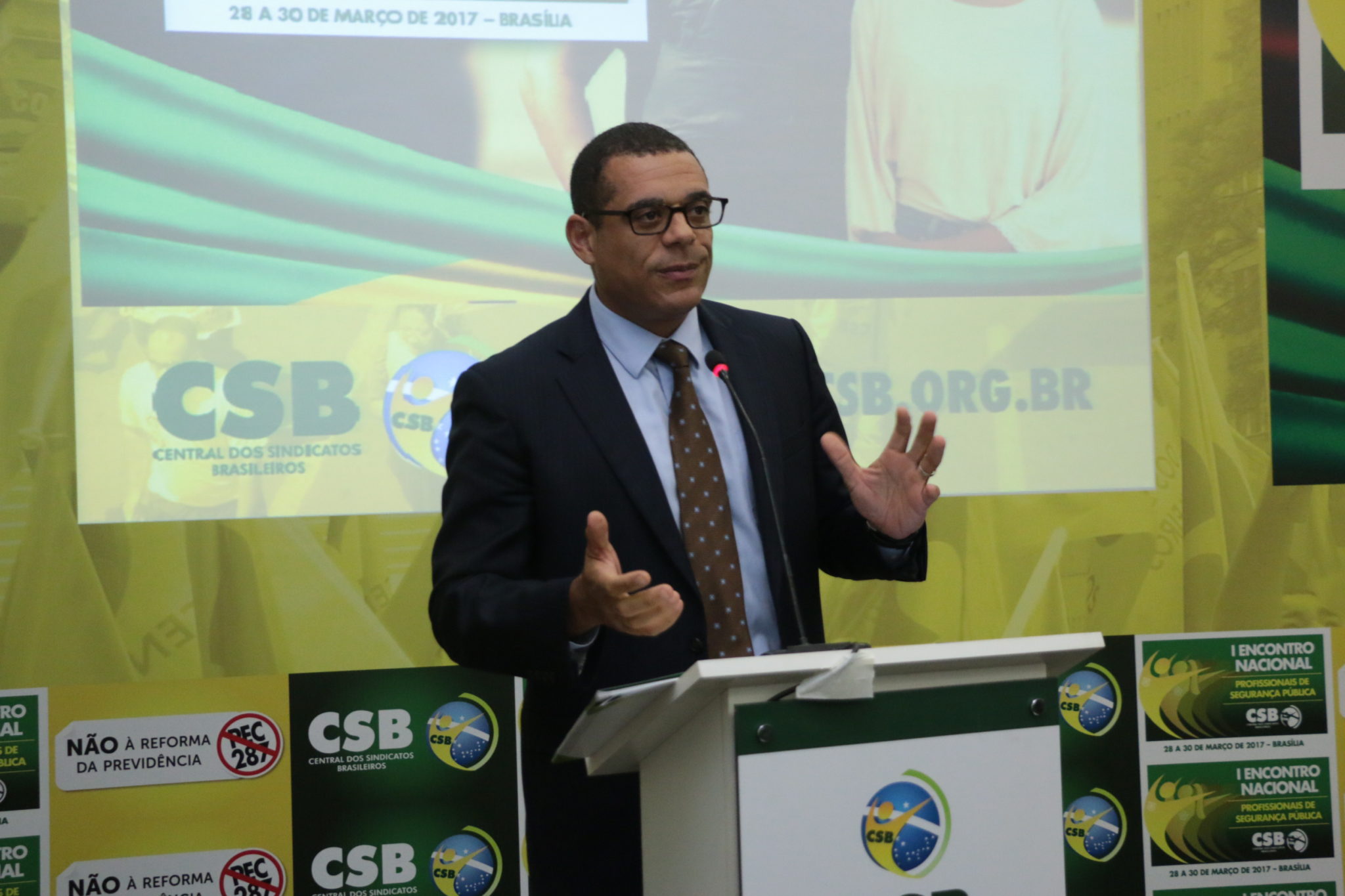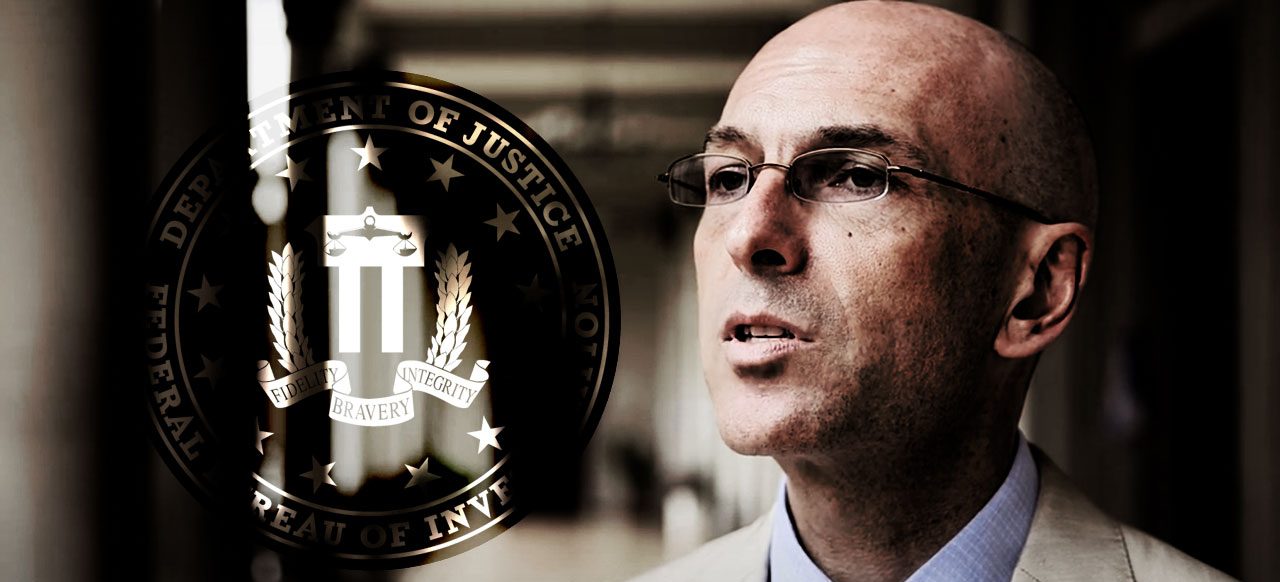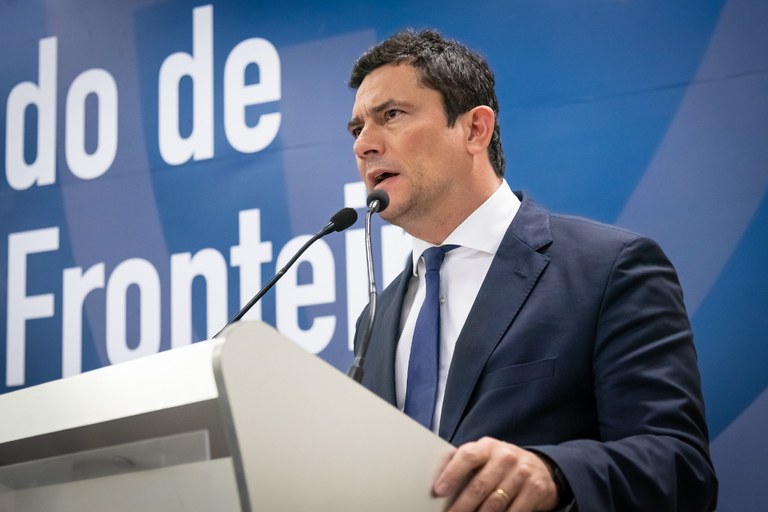In an important new investigation, journalist Natalia Viana of Agência Pública has revealed how, during Sergio Moro’s 15 month tenure as Justice and Security Minister under Jair Bolsonaro, he quickly enabled the US Federal bureau of investigation to drastically expand its activities and reach in Brazil.
The report reveals meetings involving the representatives from other areas of the US Government, such as the Treasury, with the new Justice and Security Minister in the first weeks of his tenure, intended to “deepen Brazil’s legal cooperation with the United States”.
The expansion of the FBI’s presence in the country includes further collaboration with Brazilian prosecutors and Police, partnership on a surveillance unit in the strategically important Triple Frontier region, and a level of access to Brazilians’ biometric data which opens up potentially grave abuse of human rights.
FBI director in Brazil, David Brassanini, is also revealed to have met with a notorious far-right advisor to Jair Bolsonaro, who is accused of disseminating fake news and encouraging online lynchings.
Translated by Brasil Wire, edited for readability and republished with permission. Original version in Portuguese.
By Natalia Viana. May 4, 2020
Months of investigation into official documents by Agência Pública reveal that, upon assuming the Ministry of Justice, former judge and Federal Police director Maurício Valeixo signed agreements with the FBI, expanding American influence in different areas of fighting crime, including the presence of foreign agents in an intelligence center on the border, investigations into corruption, and access to Brazilian biometric data.
At the end of 2019, the FBI’s Brazil office asked the US government for more resources to expand its team and respond to more requests for international investigative cooperation in the country.
The FBI is prohibited from conducting investigations in foreign territories – including Brazil – because the American police have no jurisdiction in the country.
However, FBI agents operated freely in Brazil until 2004, when FBI former director Carlos Costa admitted to the Ministério Público Federal that the agency coordinated and financed Federal Police operations, which established a relationship of “subordination to American authorities”. Afterwards, the Luís Inácio Lula da Silva and Dilma Rousseff administrations sought improve the Federal Police structure in order to achieve more independence.
Sergio Moro’s actions indicate a reconnection with the FBI, unknown to the public up to this point.
Although the two biggest investigations of Lava Jato by the US Department of Justice (DOJ) have already ended, with the agreements of Odebrecht and Petrobras, the FBI “still has a lot to do to investigate corruption in Brazil”, in the words of the FBI chief in the country, David Brassanini, in a lecture at the 7th International Compliance Congress, in May 2019, in São Paulo.

Announcement of David Brassanini’s participation in the International Compliance Congress
He highlighted he partnership with the Policia Federal in the Lava Jato investigations as an alliance that deserves praise. It was from there that the relationship between the agents intensified. A joint report from The Intercept Brasil and Agência Pública showed that, since 2015, FBI agents have been in Curitiba to interrogate whistleblowers who were closing deals with Brazilian prosecutors.
The FBI is able to investigate transnational corruption thanks to the FCPA (Foreign Corrupt Practices Act), a law that allows the US government to investigate and punish acts of corruption in the United States involving foreign authorities committed by foreign companies and individuals. The crimes need not have taken place on American soil – it is sufficient, for example, that there has been a transfer of money through an American bank or that the companies involved sell shares on US stock exchanges. It was based on this law that the American government punished Brazilian billionaires targeted by Lava Jato with fines, including Petrobras and Odebrecht.
Brassanini also revealed, at the same event, that FBI agents come to São Paulo “every week to deal with different cases involving FCPA and money laundering”. According to him, the collaboration with the PF has already yielded a lot of information for the coming years. “Brazilian Federal Police officers recently told me that even if they do not collect any additional information or do any investigative work, they would still have material to continue investigations into corruption and money laundering for the next five years.”
David Brassanini has been FBI chief in Brazil since August 2017, but he has served on the agency in the countrysince 2006. He is married to a Brazilian, with whom he has four children, and is fluent in Portuguese. He currently manages the FBI’s work at the embassy in Brasilia and at consulates in São Paulo, Rio de Janeiro, Recife, Belo Horizonte and Porto Alegre – including cooperation with Lava Jato – with a team of 20 people, according to the specialized publication Global Investigative Review .
He was the main articulator of a more “assertive” posture by the American police in the ministry led by Moro. In addition to meeting with the minister himself at the beginning of his term, Brassanini met with secretaries and even had a meeting with the controversial special advisor to President Jair Bolsonaro, Filipe Martins. Martins is a 31 year old follower of U.S.-based far-right “guru” Olavo de Carvalho and a former U.S. Embassy employee, who has been an influence on the foreign policy of the Bolsonaro government, alongside the President’s son, congressman Eduardo Bolsonaro.
The meeting took place on July 18, 2019, at 5:30 pm, at Planalto Palace. Martins was accused by deputy Alexandre Frota during testimony to the CPI (Congressional Inquiry) into Fake News of introducing Bolsonaro to Steve Bannon and of “promoting virtual lynchings”. Martins was summoned to appear at the CPI to clarify his alleged participation in the so called “hate office” which controls the President’s digital militias, and operates as a factory for fake news.
At the meeting with Filipe Martins, Brassanini was accompanied by William Popp, Deputy Chief of Mission at the United States Embassy.
While in 2018, during Michel Temer’s government, Brassanini made only a “courtesy visit” to Rogério Galloro, then national secretary of the Justice Ministry, there were at least four official visits in 2019.
The first visit took place at the very beginning of the government. On January 17, 2019, Minister Sergio Moro received a delegation from U.S. authorities to discuss ways to deepen Brazil’s legal cooperation with the United States, according to the Ministry of Justice website. In addition to Brassanini, US Treasury policy advisers, business manager Doug Koneff, economic director Frank DeParis and political advisor Kristin Kane, all embassy employees, were at the meeting.
The following week, on the 24th, Brassanini met all morning with Jorge Barbosa Pontes, from the Education and Statistics Directorate of the Ministry of Justice, as well as General Theophilo, then secretary of the National Public Security Secretariat. According to the official agenda of the director, the topic of the meeting was a partnership for training at the Ministry’s National Academy of Public Security.
The previous day, American police attaché Jason Smith had visited the Education and Statistics Directorate, accompanied by two other representatives of the embassy.
On August 12, Brassanini met again with Jorge Pontes and with other secretaries, among them the Ministry of Justice’s integrated operations, Rosalvo Ferreira; the general coordinator for combating organized crime, Rodrigo de Sousa Alves, the assistant secretary José Washington Luiz Santos, the intelligence director of the Integrated Operations Secretariat, Marcos Aurélio Pereira de Moura, and the intelligence director, Fábio Galvão da Silva Rêgo.
These meetings were attended by the regional security attaché at the United States embassy in Brasilia, Jason Smith, and a delegation of special agents from the State Department’s Diplomatic Security Service. The meetings revolved around two partnership projects: “Discussions about the biometrics project and the creation of the fusion center”, according to an official record.
Biometric information is at the heart of an agreement signed on March 18, 2019, during an official visit by Moro and former Policia Federal general director Maurício Valeixo to Washington, during which they accompanied President Jair Bolsonaro’s first official visit. Moro met with then-Homeland Security Secretary Kirstjen Nielsen and FBI director Christopher A. Wray. He had lunch with FBI and Policia Federal members at The Capital Grille steakhouse, according to Folha de S.Paulo. According to the official agenda, the lunch was offered by FBI deputy director Charles Spencer.
The agreement signed between Valeixo and Christopher A. Wray, obtained by Pública via FOI, aims to exchange information on criminal and terrorist groups based on the sharing of fingerprints of citizens of both countries for the purposes of criminal investigations.
Any of the police can ask for fingerprints and other identifying data, such as name, social security number, social security number and identity number, place and date of birth, in cases involving “an individual who is reasonably suspected of being a terrorist” or “Individuals suspected of having committed serious crimes or transnational criminal activities”. Serious crimes, according to the agreement, are all those whose sentence exceeds one year in prison.
The fingerprints will be inserted by the FBI into US national databases, which other agencies of the US federal government and state governments have access to, according to the document.
DOCUMENT: INTER-INSTIUTIONAL AGREEMENT BETWEEN BRAZILIAN FEDERAL POLICE AND FBI
In October of last year, Bolsonaro signed a decree establishing a unique database, the Cadastro Base do Cidadão, which will link different databases on Brazilian citizens, including numbers of records and documents, biographical and biometric data, such as “palm of the hand, the fingerprints of the fingers, the retina or iris of the eyes, the shape of the face, the voice and the way of walking”. The decree comes at the same time as it advances the collection of biometric data of the population, such as biometrics for the elections, for example, which reached 120 million voters this year.
“Biometric data, according to the General Data Protection Law, is sensitive data. Sharing these to form this Citizen Base Register allows more data, sensitive or not, to be used, in order to extrapolate the purposes for which it was collected”, says Joana Varon, director of the organization Coding Rights, which defends data privacy .
Joana says that the agreement signed by Valeixo can lead to abuse, since the definition of what would be a “suspect” is quite broad. “Police cooperation agreements, which involve the exchange of sensitive data, such as biometric data, need to be more specific and delimited to ensure that this exchange of information is really necessary and proportional to the intended purposes, especially in the political moment in which we live.”
According to Varon, the treaty may have more weight in the context of an institutional threat to the Policia Federal. “These limits are even more important if we consider that the Bolsonaro government conducts a policy of total subservience to the American government, as well as if we take into account that we live in moments of democratic crisis and threats of political interference in the Federal Police”, she concludes.
On the same occasion, Maurício Valeixo also signed an agreement with the US Chief of Customs and Border Protection, Kevin K. McAleenan, to allow a Brazilian Policia Federal delegate to be stationed at the National Threat Identification Center, and at the same time, that an agent of the US Department of Homeland Security be assigned to the Policia Federal in Brazil, to coordinate border security actions.
DOCUMENT: INTER-INSTITUTIONAL COOPERATION BETWEEN DEPT OF HOMELAND SECURITY AND FEDERAL POLICE
The “Fusion Center” at the Triple Frontier in Paraná
The “Fusion Center” – or Integrated Border Operations Center (Ciof) – is an intelligence office at the Triple Frontier of Foz do Iguaçu that aims to bring together agents from 16 institutions and unify databases. The model is inspired by the center run by the DEA, the American anti-drug agency, on the border with Mexico, which Moro visited in June last year.

Jason Smith at the 1st Meeting of CSB Security Professionals on March 29, 2017
In September, Moro spoke again about the Fusion Center with an American delegation at the Palace of Justice in Brasilia, this time with the Assistant Director General of the US Department of Homeland Security, David Peter Pekoske.
The Integrated Border Operations Center is a dream project of the American embassy, which for at least ten years has been pressing the Brazilian government to investigate suspicions of terrorist activities in the region – a demand which had faced resistance from PT (Workers Party) governments, as revealed in diplomatic documents published by WikiLeaks.
In January 2008, for example, the US Ambassador complained that Lula’s government “refuses to legally or even rhetorically label U.S.-designated terrorist groups such as HAMAS, Hizballah or the FARC as terrorist groups”.
Sergio Moro at the opening of the Fusion Center in Foz do Iguaçu
On November 6, 2019, the former minister took a small American entourage to present the project. There were the American consul, Adam Shub, and members of the FBI – among them David Brassanini. “The United States has been a great partner for Brazil in this activity, in others as well, and we are taking advantage of the model that has already been built. We asked for help with training and equipment,” said Moro.
DOCUMENT: PROPOSAL FOR FUSION CENTER AT TRIPLE FRONTIER IN PARANÁ
The center was finally opened on December 16 at the Technological Park of the Itaipu hydroelectric power plant, in Foz do Iguaçu. A month earlier, Brassanini and a small American entourage took a special tour of the facilities, guided by none other than Sergio Moro. The day after the visit, Moro announced the signing of an agreement with Paraguay, Uruguay and Argentina that allows police officers to cross the border to act in neighboring countries during operations.
“It is as if there is a permanent task force, with the objective of preventing and suppressing border crime (smuggling, drug and arms trafficking, financing of terrorism and protection of critical structures for the country). For this reason, the strategic location is in Itaipu”, stated Moro, on the opening day.
The center will manage unified databases from the joint action of members the Policia Federal, Federal Highway Police, National Intelligence Agency (Abin), Ministry of Defense, Financial Intelligence Unit (FIU, former Coaf), Federal Revenue, Military Police, Civil Police, Scientific Police to fight organized crime at the Triple Frontier in Foz do Iguaçu. There will also be “attorneys [police] from other countries”, Moro told the local newspaper Tarobá News .
According to the Justice Ministry, the center will work mainly to combat arms and drug trafficking. The teams will also monitor illegal financial movements.
In the same week, the FBI created a team specialized in topics such as terrorism and drug trafficking to operate in Paraguay, according to the Associated Press.
Barred from carrying out investigations in foreign territories – including in Brazil – agents like Brassanini walk on egg shells when they have to explain their work.
In an official FBI video of Brassanini, he explains: “Although we may not have jurisdiction in the country where we are located […], we have the ability to seek out and speak to our partners, who have jurisdiction, to work with them, and say, ‘Hey, we’re looking for this fugitive, do you know where he is? Can we help you? Is there anything you might need to help find them, whether it’s training, or other sophisticated techniques that we can use to identify, find this fugitive? ‘.”
The FBI and the embassy refuse to detail publicly what their agents do in Brazil. But a document from the embassy itself reveals how this work functions. An advertisement from October 19, 2019 is looking for a “security investigator” to work on the legal attaché team and spend 70% of the time doing investigations.
“These investigations are often highly controversial, they can have significant social and political implications,” says the advertisement text, written in English.
DOCUMENT: BASIC FUNCTION OF POSITION MAIN DUTIES SECURITY INVESTIGATOR
Among the tasks listed are “investigative assistance related to violations of US law” to public security officers, including the Ministry of Justice, Federal, Civil and Military police and the Attorney General’s Office (PGR). Thus, “the position requires an ability to interact at a professional level with members of the security community at a high level and at an operational level on operational and relationship issues.”
The professional must “appear with (or sometimes without) the legal attaché team at meetings with members of the Brazilian government,” accompany the Brazilian press and maintain “investigative and training databases related to liaison contacts, conferences , topics, speakers, photos, and materials that can be easily accessed for compiling evaluations, as needed”.
The advertisement warns that the police officer will have to travel by car, boat, train or plane for up to 30 days. “Travel to remote border areas and to all regions of Brazil will be required.” The salary amount is not disclosed.
Sought out by Agência Pública, the US Embassy in Brasilia had not answered the questions sent by the reporter at the time of publication.
*Additional reporting by Jeremy Bigwood and Raphaela Ribeiro
[qpp]


